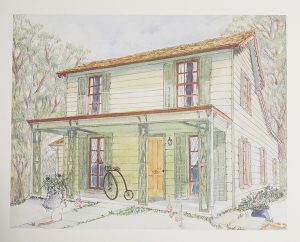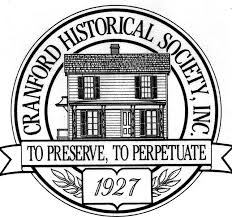
The Crane-Phillips House
Known as “Cranford’s Historic Gem,” this quaint Victorian cottage stands next to the Rahway River near the 18th century river crossing at the Crane’s Mills. The Crane-Phillips House was placed on the National and State Registers of Historic Places in 1997. The House was given the rare honor of being named to “Save America’s Treasures” by The White House and the National Trust for Historic Preservation in 1999. It is among only 27 such sites in the state of New Jersey, and it is the only “American Treasure” in Union County. A model of the Little House was on display in The White House for Christmas 1999 and the Museum was featured in Victorian Homes Magazine in August 2000.
Originally built as an East Jersey Farm House by the Crane family, the house was renovated in the style of Andrew Jackson Downing’s romantic Victorian cottage architecture by its subsequent owners, the Phillips family. The children’s room was created in 2004 and has become a favorite feature. A project began in 1996 to restore the entire Museum to what it may have looked like in the 1870s. The Victorian cottage’s vibrant, two toned green and red exterior colors, circa 1870, were uncovered and restored in 1998. Cranford Boy Scouts built an “outhouse” and a picket fence and trellis for our flower garden as part of their Eagle Projects. We also built a tool shed to display tools from the era for students and visitors.
The Crane family came to New Jersey from England as early settlers in the New World, and they were among the first to venture into Elizabethtown in 1715. The Cranes were the first to build mills, a gristmill and a saw mill, along the Rahway River in 1716. The House was built in 1842 as a one room cottage. According to family tradition, it was given by Josiah Crane, Sr. as a wedding present to his second son, Josiah, Jr., including everything between the main street, which is now North Union Avenue, the river and the railroad. It is not known exactly how long Josiah Jr. and his family lived in the house, but it is thought that they were there until 1852, when they built a larger home a short distance away, across from the Presbyterian Church where the gazebo stands today.
After the Civil War in 1867, the house was purchased by Civil War Veteran Henry Phillips and his wife, Cecelia of New York City. They paid $1900 for the house and surrounding property. Henry was an engraver and inventor. In 1895, he obtained a patent for a ‘range shield’ (US Patent No. 572,715), which was designed to “prevent the escape of smoke and empyreumatic odors from cooking into the room.” It was the direct forerunner of our modern range hood. His brother, Dr. Charles H. Phillips, was the inventor of Phillips Milk of Magnesia.
Today, the Crane-Phillips House Museum offers a rare glimpse of the life of a modest family in the Victorian Era of opulence. An inviting parlor illustrates the late 19th century era of invention and highlights inventions that changed everyday life for the average person by way of the house’s second owners, the Phillips family. Permanent and changing exhibits are displayed, featuring items from the Cranford Historical Society’s costume, tool and local history collections. In cooperation with the Board of Education, the museum serves as a focal point for the teaching of local history to area students.
On February 17, 1927, the Crane-Phillips House became the first headquarters of the Cranford Historical Society. Now, it is purely a Museum, operated and maintained by the Society, and is open every 2nd and 4th Sunday of the month, except holiday weekends, between 2:00 and 4:00 from September through May. The Museum and its artifacts exist through the support and generosity of its members in addition to donations. For more information, contact the Cranford Historical Society at (908) 276-0082 or cranfordhistoricalsociety@verizon.net. On our website, www.cranfordhistoricalsociety.org , you can learn more about the Society, our events and the history of our wonderful town, and shop for maps and books.

Recent Comments